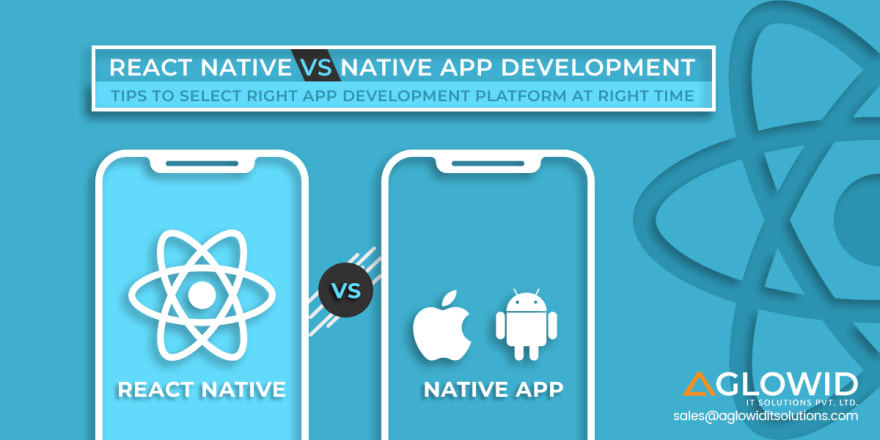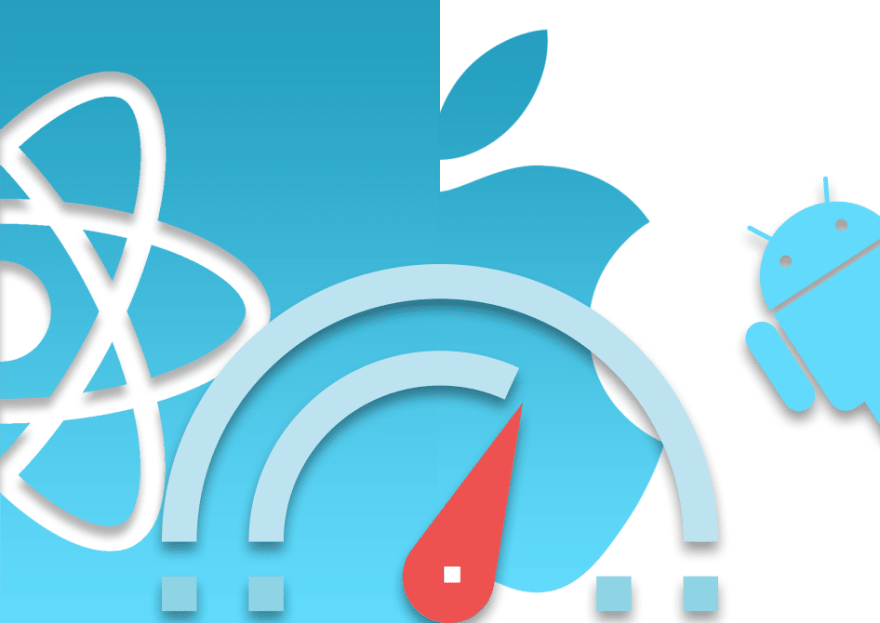Ever since Cross-platforms app development came into light, native vs. non-native has become an ongoing debate. Sometimes native gets an edge and sometimes non-native. In fact, it’s a never-ending debate as both platforms are getting the advantage of time and reasons to be used.
However, such is the case that keeps us remain confused. Developers, investors, vendors and tech enthusiasts keep asking whether which one from the two (native vs. non-native) to be used.
Recently we have received many questions related to React Native vs. Native app development. We found that many of our clients and readers seek some valid and genuine comparisons between the two platforms.

So, we are all here with this article which responses of all your unsolved questions. We have tried our level best to keep you not to be confused by bringing a crystal clear analysis of the two platforms.
The article is all about React Native vs. Native and We have focused on every core issue that you want answers for.
Let’s Get into React Native Vs Native App Development
When you want to develop a mobile application, you have some serious challenges to tackle first. We are just helping you find some important notes or you can say the challenges that may arise before the app development and before selecting from React Native or Native development. They are;
- Understanding the app usability in your business
- Understanding your audience
- Understanding their demands and expectations
- Understanding the development cost
Having gone through the basic points, you stuck at the main issue whether you should go with React Native, which is a cross-platform development framework or with Native framework. To short out these issues, you need to understand the basic difference between the two development platforms. The entire article differentiates the platforms help you conclude in a precise way. So, let’s go through one by one.
What is Native and Non-Native Development
Native development is something when an application is developed for a particular platform using the dedicated programming language.
For example, the developer uses Objective-C or Swift for iOS app development and Java or Android Studio for Android app development. In simple term, you need to develop an application separately for each platform.
Non-native or hybrid app development is something when a single application is built for cross platforms.
For example, developers can use a hybrid framework such as React native to build cross-platform applications. Here the formula “Code once, use everywhere” applies in this case.
What is React Native?
React Native is an open source cross-platform frameworks which are used to develop applications for both Android and iOS platforms. One application can run across both platforms.
That means developers save almost half of their time and development cost. It was made open source in 2015 and since it has grown to become the most favored technology for most of the top industries including Facebook (itself), UberEats and many others. The content is so
For Native development, we have explained in the paragraph written above. Besides, we’ll broadly explore the potentials of Native development in the following paragraphs in this article.
Pros & Cons of React Native
What is Good in React Native
Let’s come straight to the core point and understand the pros and cons of React Native. So far, we learned about the basics of React Native. In this paragraph, we’ll learn about the pros of React Native mobile app development framework.
Saves Development Time
Almost 40% of development time can be saved when you use React Native framework. When you use React Native to develop an application from the start till deployment take comparatively less time than Native app development.
Easy for Web Developers
Turning to mobile app developer is a complex task for a web developer has to do while React Native provides solutions for it. Being a JavaScript framework, transitions become absolutely easy for Web developers.
Hot Reloading
When a developer uses React Native, the framework saves the file. The result can be seen on the device immediately after making any changes. Developers don’t need to reload the entire application every time they make changes or edit.
Open Source Framework
React Native is an open source mobile app development technology. That means you can freely download it and develop applications. Besides, it comes with the opportunity for developers to understand the framework by inspecting the codes and even improve the framework if they come across any bugs in it.
Single Code Base
When it comes to React native, more than 70% code can be can shared across cross-platforms such as Android and iOS. There come the benefits for developers as they don’t need to learn different languages and platforms. At the same time, it will help developers of all set of skills and experience to work like a pro.
Read More : Why Startups Prefer React Native for Mobile App Development
What is Bad in React Native
React Native is a cross-platform framework and has been adopted by top industries including Facebook, UberEats, and others. However, it has some drawbacks that make the framework incompatible in some cases. Recently Airbnb, which was one early adapter of React Native, dropped it and shifted to Native due to many reasons. You can read the Airbnb and React Native case study here. Besides, we have also highlighted some of the main issues which lower down the confidence of developers and investors.
Immaturity
According to Airbnb report, immaturity was one of the main reasons it dropped the technology. The report said that React Native is moving quickly which good in some cases but creates plenty of other issues as well.
Inadequate Native Elements
When you develop an application on React Native, the app cannot access the Native Elements of the device. You cannot access voice Recorder and camera directly in React Native. However, you can use native modules through a third-party library to access elements.
Minimal Third Party Library
Having a limited third-party library, React Native needs to use native libraries which is possible when the incorporation is made in native modules. That means it increases development time, efforts and money.
Cannot Support All Native APIs
As claimed, React Native supports some, but most important Native APIs, but at the time, it does not have the freedom to use all Native APIs. That means developers working with React Native needs access to other APIs and functionality through native modules.
Tough To Learn…?
As discussed earlier, React Native is easy to learn. However, it’s not so easy, in some cases, at all. For example, React Native has introduced Native Modules which are written in Native languages. That means developers must have knowledge of all three platforms such as iOS, Android and React Native.
Design Creates Ruckus
iOS and Android follow different design guidelines. In the case of React Native, the graphical elements are transformed automatically, but placement stay differs from each other. In such a case, developers need to develop separate code to follow the design guidelines.
Pros & Cons of Native Development
What is Good in Native
Native development involves dedicated programming languages such as Swift for iOS and Java or Kotlin for Android. They are robust language and you can rely upon its usability and performance. So, you will understand it properly when you go through the pros and cons of Native Development.
API Access
Native frameworks come up with built in API and libraries that enable developers to access them directly. All the features and functionalities offered by APIs can be obtained instantly. These APIs are dedicated and have no extra layer mapping. Hence they do not require updates and have no restrictions at all.
Performance
Apps developed with Native are unbeatable in performance. For example, it involves dedicated technology such as Swift & Java for iOS & Android respectively. These technologies provide everything that they require to give a complete finish to the application. Hence, choose the framework wisely.
Low Maintenance
If you want to develop app for iOS, then you need to use Swift programming language or Java for Android, then initially you need to spend individual time for both as compared to the React Native development. However, after some time, it will lower down the maintenance cost which will help you in the long run.
Third Party Libraries
Abundance in third-party libraries gives freedom to developers to make robust, effective and customized applications. The benefits you get with a Native development environment due to its large community. You have plenty of resources to help you improve your development experience and applications.
Robust Language
Of course, if you want something strong, reliable and effective, Swift, Kotlin and Java can be relied upon. They are very effective and excellently dig out a hidden error in code. Swift & Java are dedicated programming language for iOS and Android respectively. Therefore they deliver robust output.
In short, in Native development environment, you get all facility, features, functionalities, and robustness that you suffer to have in React Native development.
What is Bad in Native
Though Native Development is considered to be the most effective and error-free solutions. However, it has a few drawbacks as well. They might affect your application.
Consumes Lots of Time & Efforts
Developing an application using Native frameworks requires lots of time and efforts. It uses native programming languages which slows down the development process. If you are looking for apps on both platform, then you need to develop two applications for iOS and Android separately.
Develop Two Application
Yes, as we have told you in a paragraph written above that you using Native development, you can create a separate application for each platform. For example, you cannot use Java for both Android & iOS app development. Similarly, Swift also cannot be used for iOS and Android app development together.
Which is the Best from React Native and Native App Development?
Both development environments hold some good and some bad together. So, deciding which one out of the two to go with is intricate.
However, we have explained the pros and cons of React Native and Native development environment. You may have got the concept of the two development environment and confidently choose the right one from the two.
However, there are some other factors do play a role in taking a decision. So, in the following paragraphs, we’ll explain some more useful points through differentiating the different platforms. Here are some of the basic things to consider before taking a decision.
React Native VS Native App Performance
When it comes to performance, you have two things to analyze. If you have small-sized application to develop and if it is not for any complex task to perform, then React Native can be the best option.
However, if you have some important tasks to perform or when you want to develop the medium and large-sized application, then you should go with Native development.
Honestly speaking, nothing and no hybrid framework can beat native development in terms of performance. Even if you hire to React to Native developers, they would suggest the same. Is React Native mobile performance comparable to that of Native.
When to Choose React Native for Mobile App Development
Well, we don’t think that still, we need to explain whether which development environment should you go with. However, for this particular question, we would suggest that;
- If you have a small application
- If you have a small project
- If you have projects that you need to finish it in a shorter period of time
- If you don’t want to spend a lot on your projects
then, React Native is the ideals choice. You will get plenty of benefits using React Native. Not only you will save time and cost, but you can get your project done and implemented in less time also.
When to choose Native for Mobile App Development
Obviously when you have everything opposite to React Native… as simple as that. Yes, that’s the straight forward answer, but when you have some complex projects in hand and it has some purpose to serve or to carry some important critical tasks, then Native environment is the best option.
You need to look no other than hiring native app developers. It will take comparatively more time to complete and even you need to hire iOS developer and Android developers separately for the projects.
But, it will reap benefits in the long run. Besides, you can consider the following points before choosing Native development.
- When you have a complex application
- When you are focused more on native users
- If you want to develop IoT friendly application
- If you are creating an app for a specific platform only
Top Apps Built on Native and React Native Development Environment
Both have grown up, but you can find a huge difference between the two.
However, React Native is new and gaining momentum while Native apps have been for a long time and achieve lots of credibility. We are placing some of the top application made on both platforms.
| Native | React Native |
|---|---|
| GOOGLE NOW LAUNCHER | |
| LASTPASS | |
| SWIFTKEY | F8 |
| BUZZ WIDGET | Bloomberg |
| POCKET CASTS |
Conclusion
We believe that React Native and Native development both are integral to application development. However, the use of a certain development depends on the platforms you choose.
Besides, you have various other factors which play the role. I have explained everything to you in this article.
However, if high performance, scalable and high-traffic oriented applications are in demand, Native development will be the right decision.
In case, if you have any tips regarding React Native or Native development, do share with us. We appreciate your efforts.










Top comments (1)
Thank you for your comparison, it is thorough indeed! And if we speak more about cross-platform frameworks, what do you think about Flutter? According to Google Trends 2016-2020 (seen it in this article surf.dev/flutter-vs-react-native-c...), Flutter trends better than React Native and people google it more often recently.